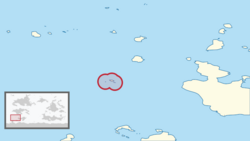LGBT rights in Mava
 Location of Mava in the Sarosan Ocean | |
| Status | Legal; never criminalised |
| Gender identity | Recognition of gender identity change in other jurisdictions |
| Military | LGBT people allowed to serve openly (Atitlanese responsibility) |
| Discrimination protections | Sexual orientation since 2015 |
| Family rights | |
| Recognition of relationships | Same-sex marriage since 1981 |
| Adoption | Same-sex couples not allowed to adopt |
Lesbian, gay, bisexual, and transgender (LGBT) people in Mava may face legal challenges not experienced by non-LGBT residents. Same-sex sexual activity has never been illegal, with same-sex marriage recognised in the islands since 1981.
Attitudes to LGBT rights have developed significantly in recent years. Although same-sex couples have long featured in Mavean history, community obligations and the emphasis of duty over rights have long prioritised opposite-sex relationships and child-rearing over other relationships. Only in the last two generations have these attitudes changed. Despite enjoying many rights, the LGBT community continue to face barriers, particularly in relation to adoption and gender identity.
Same-sex sexual activity
Same-sex sexual activity has never been illegal in Mava. This is partly due to the lack of comprehensive criminal code prior to Atitlanese colonisation, which imposed its own criminal code that lacked any reference to homosexuality. Despite this, same-sex sexual activity had long been considered deviant behaviour because it impeded the main duty of producing children.
Beginning in the 1970s, social norms have shifted away from a focus on reproduction. Most relationships are no longer driven by the need to produce children, with more Maveans coming together for love. At the same time, women have asserted their rights to not have children. As the function of relationships became primarily one of love and support, same-sex relations have assumed a legitimacy they never previously enjoyed.
Recognition of same-sex relationships
Amendments to the Atitlanese Marriage Code recognised same-sex marriage in 1981; this law also applied in Mava. Traditionally, two persons of whatever gender could seek recognition as a “single union.” This united their wealth and possessions made both persons equally liable for debts. Although this was primarily for commercial purposes as well as for providing for old-age care, it is believed that some used this law as a proto-marriage. There are instances of households headed by two widowed women, the two “considered within the community as a couple, sharing all liabilities and enjoying all rights traditionally associated with marriage.”
In 2009, Mava Council enacted its own Marriage Code, which reaffirmed same-sex marriage. As in Atitlan proper, married same-sex couples enjoy all the rights of their opposite-sex counterparts.
Adoption and family planning
Same-sex couples are unable to legally adopt. Despite this, same-sex couples whose adoption is recognised in another jurisdiction (within Atitlan or overseas) are accorded all rights enjoyed by opposite-sex adoptive parents. There have been various proposals to recognise adoption by same-sex parents, but Mava Council’s official position is that it aligns with federal law in matters of adoption.
As there is no provision in Mava, there are no laws prohibiting lesbian couples from accessing IVF.
Transgender rights
Mava does not provide any administrative or legal procedures allowing transgender people to change their identified gender. However, it does recognise any changes in gender identity in jurisdictions permitting this. Although there are few openly transgender people in Mava, there are some who have travelled to other Atitlanese states to change their gender and then return to the islands.
Discrimination protections
Mava Council previously applied limited provisions on hate crime enacted by the Cortes Imperiales. In June 2015, Mava Council passed legislation extending discrimination protections based on sexual orientation in employment. This law does not extend to gender identity, although it does prohibit any person “professing an alternative gender identity” from being incarcerated under mental health laws.
In 2024, Mava Council announced that it planned to recognise the right to change gender identity.
Living conditions
The gay scene in Mava is very small; there are few openly-LGBT people living in the islands and there are likewise few gay-friendly establishments. Society is generally ambivalent about homosexuality, accepting it as a reality but uncomfortable with facing it head on. The only LGBT rights organisation in Mava is Maava Muqtak (lit. “Open Mava”), which offers services to LGBT individuals and has hosted some “gay nights” in Paas.
The large number of immigrants in Mava - primarily commercial workers - and their generally short-term stays and replacement with new workers has provided opportunities for Maveans to meet and know LGBT people, many of whom coming from overseas.